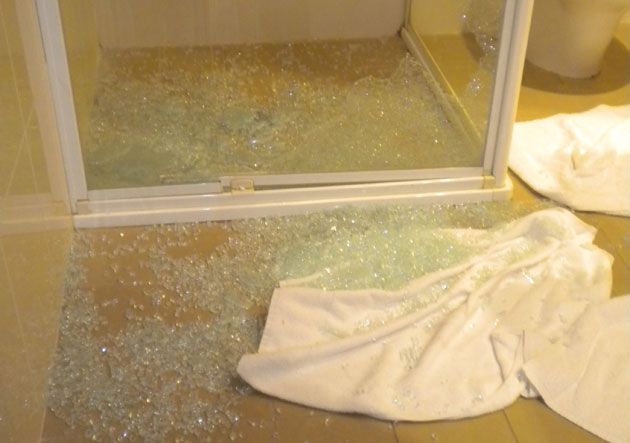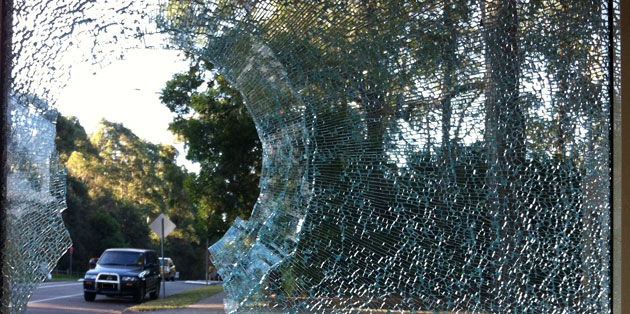
For over 25 years, I have been playing a cat-and-mouse game with spies, hackers, and busy-bodies (not counting the nosy media). It’s become so bad, that security, fire-exits, and escapes, are the first things I inspect when I enter a new building. Last month, I was shown around a new multi-million-dollar facility. While the site-manager was pointing-out the latest and greatest equipment, I rudely ignored him and gravitated towards the fire-exit and started to test the doors and to simulate a break-in from the outside. ‘Check this out,’ I said. ‘It’s perfectly simple to gain entry. All one needs is a credit card. Slide it under here, and the high-security door is unlatched!’ I am weird in that respect. Those who have ever watched me collect my mail from my Post Office Box, would notice that I stand to one side while opening the Box, for fear of an explosion or a projectile hurtling towards me. Indeed, it could be paranoia, except that I never get a moment’s peace.
In 1993 I conducted a seminar called, ‘How to become a data thief’. It was attended by every Tom, Dick, and James Bond. I was trying to show people that nothing is secure, and no system is undetectable. Every measure has a counter-measure, and every counter-measure has a counter-counter-measure. Now, Mr Rupert Murdoch and his team are being called to account for the very tactics that I was warning against almost two decades ago. I even mentioned ‘phone-hacking’ on the national news. Check this out: me on TV in 1993, speaking about hackers and spies, and showing the simple gadget needed to hack into voice mails. It amuses me when people think that the ‘News of the World’ phone hacking scandal is new or newsworthy. I’ve been aware of such antics for over 20 years.
Last week I was at a hotel. I woke up one morning to find the glass of my shower door, smashed. The hotel staff (including the maintenance and engineering crew) said that no such thing had ever occurred. The man at reception said that in his 20 years at the hotel, he has never known the glass to smash in any of the many rooms. I later had reason to suspect that it smashed due to a bombardment of radio waves entering the room in the dead of night. Someone was trying to latch onto my wifi, my computer, my phone, my internet connection, and anything else they could gather. The end-result was oscillations so severe, that they smashed the glass.

If you are fascinated by oscillations, you can watch the video below to see how simple oscillations can destroy a bridge. Tick-tock, back and forth it goes, picking up momentum until it crumbles into the sea. If waves can destroy a bridge, it’s a doddle to smash glass. Sadly, the smashed glass is an undesired consequence which will force spy agencies to re-think their snooping equipment.
 Such oscillations are well-known amongst Army personnel. Soldiers are instructed to march out-of-step while crossing a bridge because a certain rhythm can cause a bridge to start wobbling uncontrollably. Below is a video of the Millennium Bridge in the UK. Watch what happens as a result of people creating a wave underfoot. This is the same kind of physics in which an opera singer engages when trying to smash a crystal glass with her voice.
Such oscillations are well-known amongst Army personnel. Soldiers are instructed to march out-of-step while crossing a bridge because a certain rhythm can cause a bridge to start wobbling uncontrollably. Below is a video of the Millennium Bridge in the UK. Watch what happens as a result of people creating a wave underfoot. This is the same kind of physics in which an opera singer engages when trying to smash a crystal glass with her voice.
I am always under attack. Everything I have and own is always monitored, probed, searched, checked, and tracked. It becomes tiresome to check and counteract everything. It’s a way of life with me. My colleagues will tell you that even as far back at two decades ago, if ever I was imparting confidential information, I would pull out my keys and start to rattle them so as to confuse anyone who happened to be electronically eavesdropping. When I am relaxing and chatting with friends, I always have music playing in the background because a simple glass window can vibrate/reverberate (transmit) every word to the outside world for someone with the right equipment to decipher. No conversation is private. For decades, I have been alerting people about hackers, trackers, and attackers. It takes place every day. In the dark of night, there are people out there who collect rubbish bins, in search of clues. Everything is a clue. There is no such thing as useless data. It somehow always fits together, and then, voila, the puzzle is assembled.
 After the shower-glass smashed, I wondered if I had discovered something new in the world of physics. I took this theory to one of my ‘boys’ and we simulated the attack from his car (seen to the right in the background), aiming his equipment at a similar pane of glass in his garage, simulating an intense snoop. Sure enough, the glass smashed after only five minutes at full pelt (as if a brick had been thrown). The error exposed via this kind of espionage falls into a category which, over 20 years ago, I called ‘The Plateauing of Technology’. This means that new technology cannot gallop forward, simply because old technology holds it back. I used the example of why aeroplanes cannot go any faster, mentioning the existence of glass buildings as the inhibitors. You see, for planes to travel faster above our cities, they would have to break the sound barrier. In so doing, they could smash most of the windows of the glass buildings. An old technology stops the development of another newer innovation. This is the opposite of the other syndrome I discussed whereby a ‘new technology’ desperately needs an ‘old technology’, as is the case with modern phones. As brilliant as they are, they could not exist if it were not for the most basic of technologies — the battery. Without that mundane, simple, basic, dull old technology, the latest phones could not exist. Another example is the office lift. The tallest of skyscrapers cannot exist without the lift, which is nothing more than ‘a rope pulling a box’. The rope and the box are basic, old, simple, and primitive. Yet, without them, it would be impractical to live in a modern building.
After the shower-glass smashed, I wondered if I had discovered something new in the world of physics. I took this theory to one of my ‘boys’ and we simulated the attack from his car (seen to the right in the background), aiming his equipment at a similar pane of glass in his garage, simulating an intense snoop. Sure enough, the glass smashed after only five minutes at full pelt (as if a brick had been thrown). The error exposed via this kind of espionage falls into a category which, over 20 years ago, I called ‘The Plateauing of Technology’. This means that new technology cannot gallop forward, simply because old technology holds it back. I used the example of why aeroplanes cannot go any faster, mentioning the existence of glass buildings as the inhibitors. You see, for planes to travel faster above our cities, they would have to break the sound barrier. In so doing, they could smash most of the windows of the glass buildings. An old technology stops the development of another newer innovation. This is the opposite of the other syndrome I discussed whereby a ‘new technology’ desperately needs an ‘old technology’, as is the case with modern phones. As brilliant as they are, they could not exist if it were not for the most basic of technologies — the battery. Without that mundane, simple, basic, dull old technology, the latest phones could not exist. Another example is the office lift. The tallest of skyscrapers cannot exist without the lift, which is nothing more than ‘a rope pulling a box’. The rope and the box are basic, old, simple, and primitive. Yet, without them, it would be impractical to live in a modern building.
THE HACKING GAME
Indeed, it is well documented that I was an experienced hacker from the age of fifteen. These days, I help organisations and governments to protect themselves from hackers and spies. If I were to regale you with stories about the lengths to which some organisations and governments go, in order to secure (and obtain) information, you simply would not believe me. The trouble, the schemes, the effort, the shenanigans, the underhanded methods, and the rough-and-tumble of the game of espionage is too bizarre, even for the world of fiction. Some people think that James Bond is too weird to be true. What they do not realise is that James Bond looks like a wimpy school boy, by comparison to what transpires day and night.
These days, within this connected world, a keen hacker (or professional spy) can tell you the last time you had your tooth seen-to by your dentist. If I set my mind to it, I can tell you when you last drove on a stretch of road, and the most recent parking or speeding fine you received. I can tell where you were, by the minute, and I can read to you any email you have ever published. Give me access to your password-protected (locked) phone, and while it is still locked, I can download the photos you took over one year ago, which you thought you had deleted. Nothing is secure. Nothing is sacred.
I did have a chuckle last week when a friend asked me if I had hacked into his ‘life’. That was funny, because he was under the impression that the only way to obtain information about someone is to hack. Little does he and others know that there are certain hackers out there who graduate to the next level. A graduated hacker is a hacker no more. We can obtain information without hacking. Passwords are front-door keys. Some of us have access to the whole warehouse of data, and we have our own key. We do not care what password you choose. What use is a simple password to anyone who has the key to the back door? Such hackers are not hackers. We call ourselves researchers. If there is something we need to know, we can find out, and no hacking would be involved. It takes seconds. It’s called ‘having access’. What we can’t access, we delegate to those who have been permitted to access all areas.
THE DELETE BUTTON DOES NOT EXIST
Another sad fact is that people think that a ‘deleted’ email is really deleted. Or a deleted photo or file is really deleted. Or a disconnected computer is really disconnected. Oh dear! I do love it when I stand in front of high school students and alert them to the fact that any and every voice mail, email, and text message, that they deleted over a year ago, is still on file. Then I ask them how they would feel if, for those under the age of eighteen, their parents could fill-in a form and gain access to all their old data. I say, ‘How would you feel if your parents were to fill-in a form, and have each and every text message you have ever sent and received, sent to them in one convenient file, in a matter of hours?’ If ever I have seen jaws drop…
Then again, some people do not need to fill-in any forms. They have access to anything and everything. You just have to know the right people. As for doing it legally, well, there are loopholes. The law is trying to play catch-up with technology. Since the 1950s, the law has been lagging. And to this day, it is miles behind.
By the way, don’t be embarrassed. Most people are the same. Most saucy text messages are the same. Most naught photos are the same. As a doctor might assure you when asking you to drop your pants: ‘I’ve seen it all before’.
HOW TO BECOME A DATA THIEF — RADIO INTERVIEW PART 1 OF 2
[audio:J_How_to_become_a_data_thief_Part_1_Lisa_Forest.mp3]
Apple users please click below:
Jonar Nader & Lisa Forest: How to become a data thief Pt 1/2.
HOW TO BECOME A DATA THIEF — RADIO INTERVIEW PART 2 OF 2
[audio:J_How_to_become_a_data_thief_Part_2.mp3]
Apple users please click below:
Jonar Nader & Lisa Forest: How to become a data thief Pt 2/2.



Comments are closed.